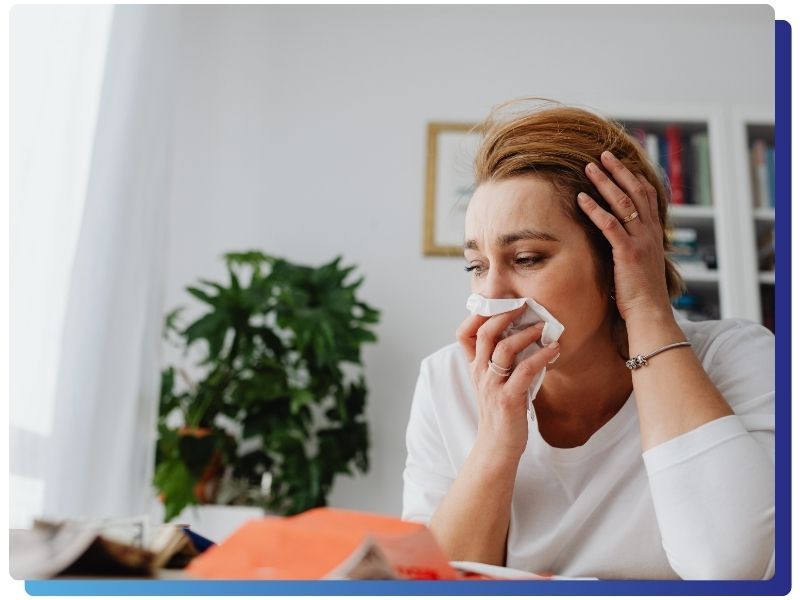For many people the rainy season brings a sense of relief. The cool air washes away the dust and heat and the environment feels fresh again. But for others it also brings sneezing runny noses congestion and watery eyes. If your nose always seems to act up when the clouds gather you may be dealing with rainy season allergies.
Understanding why this happens and learning simple ways to manage it can make the rainy season far more comfortable.
Why Allergies Worsen in the Rainy Season
It may seem strange that allergies flare up when rain is supposed to clean the air. The truth is rain changes the environment in ways that trigger allergies
When it rains pollen grains break into smaller pieces and these fragments spread through the air more easily. This makes them more likely to reach deep into the nose and lungs
Moist and damp conditions also encourage mold growth both indoors and outdoors. Mold spores are a common allergy trigger that can cause nasal congestion and watery eyes
Humidity increases dust mites inside the home. Dust mites thrive in damp conditions and can worsen allergy symptoms especially in people who are sensitive to indoor allergens
So while the air feels cooler it is actually filled with new allergy triggers
Common Symptoms of Rainy Season Allergies
Symptoms can feel similar to the common cold which is why many people confuse the two. Typical allergy symptoms include
-
Runny or stuffy nose
-
Sneezing often in bursts
-
Watery or itchy eyes
-
Itchy throat or ears
-
Fatigue from poor sleep due to congestion
Unlike colds allergies usually do not cause fever or body aches and they last as long as you are exposed to the trigger
Home Tweaks to Reduce Allergy Triggers
You do not have to spend the rainy season feeling miserable. Small changes at home can help reduce exposure to allergens
-
Keep windows closed during and after rainfall to prevent mold spores and pollen from entering
-
Use a dehumidifier or air conditioner to keep indoor air dry and discourage mold and dust mites
-
Wash bedding in hot water weekly to kill dust mites
-
Avoid drying clothes outdoors when humidity is high since damp fabrics can attract mold
-
Clean and vacuum frequently using a vacuum with a HEPA filter
-
Shower after being outdoors to remove pollen from skin and hair
These tweaks help create a safer indoor environment where allergy symptoms are less likely to flare up
When to Use Antihistamines or Allergy Testing
Over the counter antihistamines are often the first line of defense. They block histamine which is the chemical responsible for itching sneezing and runny noses. Antihistamines are helpful when symptoms are mild or occasional.
If symptoms are frequent or severe it may be time to consider allergy testing. Allergy testing helps identify exactly what triggers your symptoms whether it is mold pollen or dust mites. Once you know your triggers you and your doctor can create a personalized treatment plan. In some cases allergy shots or prescription medications may provide long term relief.
Why You Should See an ENT Specialist
Allergy symptoms can sometimes overlap with sinus infections or other conditions affecting the nose and throat. An ENT doctor can help determine whether your runny nose is truly due to allergies or something else. They can also recommend safe medications and advanced treatments if over the counter options are not enough.
At Blue Ribbon ENT in Sugar Land Texas Dr Susan and her team provide expert care for seasonal allergies sinus problems and other ENT concerns. From testing to treatment patients receive personalized care that helps them breathe easier even during allergy season.
Final Thoughts
The rainy season may bring cool air and lush greenery but it can also trigger allergy symptoms that make daily life uncomfortable. By understanding what happens to pollen mold and dust mites when it rains you can take simple steps to reduce exposure and protect your health.
If your nose seems to run with every storm or if over the counter remedies are not enough it may be time to seek professional help. For effective allergy care you can always visit Blue Ribbon ENT in Sugar Land Texas where your comfort and breathing health are a priority.

